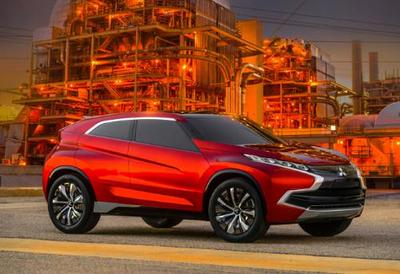IDTechEx See a Change of Course with Fuel Cells
 Mitsubishi Concept PHEV |
World Smart Energy Week 2015
CAMBRIDGE, UK -- March 11, 2015: Fuel cells are another “new” range extender if we ignore the fact that they have been around for 175 years and concentrate on the fact that they are yet to be successful in vehicles. Enthusiasts keep talking about five years from now, when the problems of cost, maintenance, size, charging infrastructure and so on start to be overcome to the point of volume production being contemplated, for example with Toyota expecting to produce up to tens of thousands of fuel cell cars. The IDTechEx report “Electric Vehicle Range Extenders 2015-2025” Range gives the full picture.
“a number of breakthrough technologies that will be bought into the second generation fuel cell vehicles between 2020 and 2025 that overcome all of these issues and ACAL Energy’s liquid catalysts will be part of this. ACAL liquid catalyst technology addresses the problems of”
Fuel cell materials developer ACAL Energy points to, “a number of breakthrough technologies that will be bought into the second generation fuel cell vehicles between 2020 and 2025 that overcome all of these issues and ACAL Energy’s liquid catalysts will be part of this. ACAL liquid catalyst technology addresses the problems of:
• Instantaneous response to load
• Removal of all cathode degradation mechanisms
• Ruggedness – ability to operate with pin-holes in the membrane
• Simplified balance of plant
• And a 50% reduction on catalyst cost when compared with the Pt cost target required to get to <$35/kW system cost.
Battery/Supercapacitor technology is complementary to FC powertrains as all the auto OEM’s we are engaged with plan some form of hybrid drive system”.
Proton Motor has developed fuel cell vehicles for 20 years with its own fuel cell stack and system design know how. It is currently developing a range extender fuel cell bus system with a fuel cell performance of 25kW and a battery on board between 80 to 120 kWh, depending on the drive cycle. This concept will allow a 12m 18 tonne city bus to run at a two shift operation with a refuelling time of hydrogen in 10 minutes. Cost for the bus is in line with the EU target for 2020, they told IDTechEx.
The advantages are fast refuelling, full range of operation, less weight and higher payload compared to a pure battery bus, less batteries on board (reduction of resources and problems to recycle large amount of batteries), low maintenance compared to a bus with a large fuel cell system, long lifetime of the fuel cell based on optimized operation mode and longer lifetime of the battery as it can be operated in an optimized SOC. Will cost be competitive? The BYD B9 is this size of bus and it is selling in many thousands already but its recharging time is 30 minutes or more.
Certainly more fuel cell cars are now appearing albeit in tiny quantities, though trials of fuel cell buses peaked ten years ago and the architecture is hybrid with the fuel cell as range extender, there being a large NiMH or Li-ion battery or a supercapacitor with conventional battery, these doing start-up, accepting energy harvesting electricity and managing load variations. Also see the IDTechEx report “Electric Buses 2015-2025” eBuses.
Given the slowness of improvements and growing competition from improved pure electric vehicles, which are greener, attitudes have changed this year, with developers realising they must be open and accept help from any quarter. At the recent World Smart Energy Week in Tokyo, GM, which did a partnership with Honda for fuel cell development out of necessity to reduce risks and required investments, now called for suppliers to approach them.
Toyota recently threw its fuel cell patents open for a limited time to try to accelerate progress. Its Mirai fuel cell car being sold in very limited quantities presumably due to cost. In Japan, Toyota told IDTechEx that they can warranty 200,000 km of fuel cell durability – big progress with one former problem - but they do not know how the car resale market will evolve. Very low resale prices for battery electric cars has inhibited sales and the same will probably be true of fuel cell cars for some time.
Volkswagen said their position on fuel cells is that they are not fully convinced that fuel cell cars will be widely deployed. They will not invest highly and will use a petrol car platform for their fuel cell car development. They are concerned about how zero carbon fuel cells cars will ultimately be, given hydrogen from fossil fuels and the complexity of manufacture. Indeed, a hydrogen fuel cell typically emits one kilowatt of heat for every kilowatt of electricity used.


